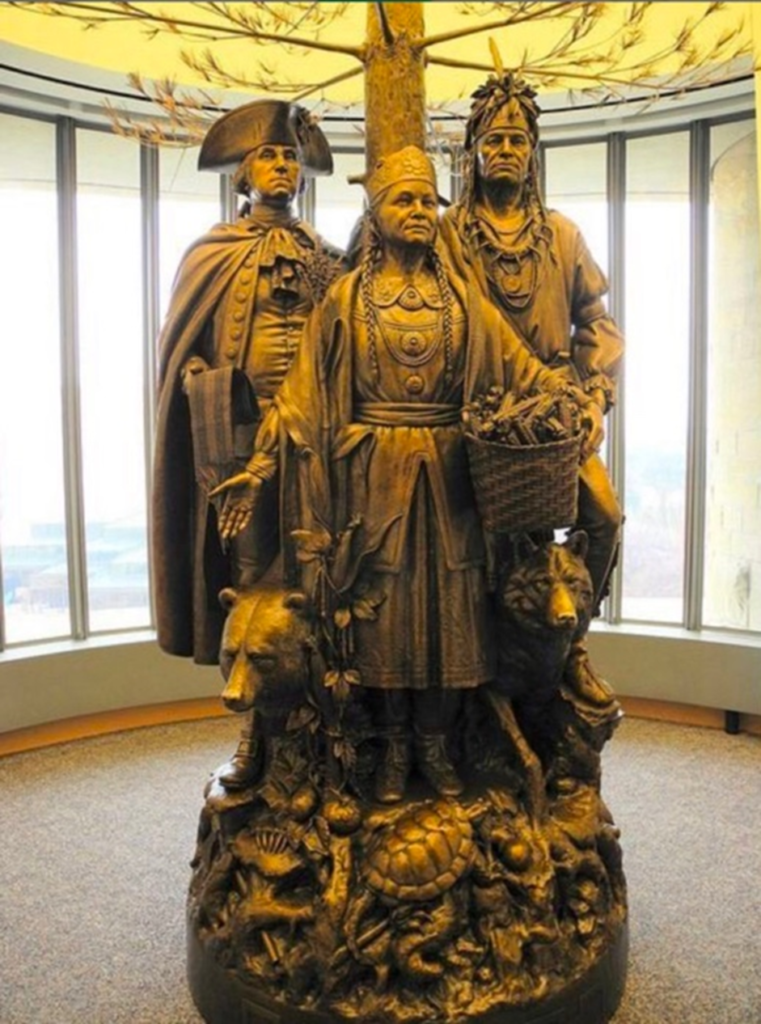Polly Cooper
A woman whose story embodies the kindness, courage, and indomitable spirit of the Oneidas
By Rachael Pei
Native American allies played an important role in America’s victory in the Revolutionary War. A notable example was the Oneida Nation, which was part of the Haudenosaunee Confederacy (also known as the Iroquois Confederacy). They fought alongside American troops, as well as providing scouts, spies, and couriers in the war effort. One of the most prominent Oneida figures was Polly Cooper, who is most well-known for her contributions at the Valley Forge encampment.
In April 1778, when American soldiers were dealing with harsh conditions at Valley Forge, Oneida Chief Skenandoah (or Oskanondonha) sent Polly Cooper and 40-50 warriors to help the troops. After walking over 400 miles from central New York, the delegation arrived at the encampment in May, bringing with them hundreds of baskets of white corn. Unlike the sweet corn sold at grocery stores today, white corn needs to be dehulled and roasted before it can be consumed safely. The soldiers were so starved that they tried to eat the corn raw, but Polly stopped them and taught them how to properly prepare it.
When other members of the Oneida delegation began to leave Valley Forge, Polly stayed behind to care for sick soldiers, teaching people at the encampment about various nutritious/medicinal foods, including a soup made from hulled white corn. During her time at Valley Forge, Polly refused to accept pay for her help, though she did receive a black shawl from Martha Washington and other soldiers’ wives as a gesture of appreciation. The shawl has become an important historical relic, passed down and cared for by her descendants.
After Valley Forge, Polly continued to support the war effort by helping soldiers. In unpublished papers owned by the Oneida Indian Nation, Oneida Chief William Rockwell provides more detailed insight into her character: “When I was a boy, I used to hear my people talk about Polly Cooper’s bravery, about how she cooked and carried water to the soldiers…. Polly Cooper gave water to the enemy soldiers as well as to the men in the colonial army because she believed the war was not over water or food… Polly knew the war was about freedom in thought, to develop principles for the good of all living and the coming generations.”
In 2005, the Oneida County Historical Society inducted Polly into its Hall of Fame to recognize her honorable contributions. The Oneida Indian Nation has also commemorated Polly’s efforts through a statue that depicts her standing beside Chief Skenandoah and General George Washington. The memorial was gifted to the Smithsonian Institution’s National Museum of the American Indian and serves as a reminder of the Oneida’s generosity and friendship during the US’s fight for freedom.
Sources:
https://www.nps.gov/vafo/learn/historyculture/valleyforgewomen.htm
https://www.nps.gov/fost/learn/historyculture/the-oneida-nation-in-the-american-revolution.htm
https://www.battlefields.org/learn/biographies/polly-cooper
https://womenhistoryblog.com/2012/04/polly-cooper.html
https://www.oneidaindiannation.com/polly-cooper-oneida-heroine/
https://civileats.com/2018/04/20/an-indigenous-corn-makes-a-comeback/
https://www.oneidaindiannation.com/allies-in-war-partners-in-peace/
Pictures of the statue featuring Polly Cooper, Chief Skenandoah, and General George Washington. It can be viewed in the Smithsonian Institution’s National Museum of the American Indian in Washington, D.C.



Here is also a picture of her shawl.

Links to the pictures (in order):
https://www.battlefields.org/learn/biographies/polly-cooper
https://www.womenhistoryblog.com/2012/04/polly-cooper.html
https://www.kophistory.org/oneidas-and-polly-cooper/

